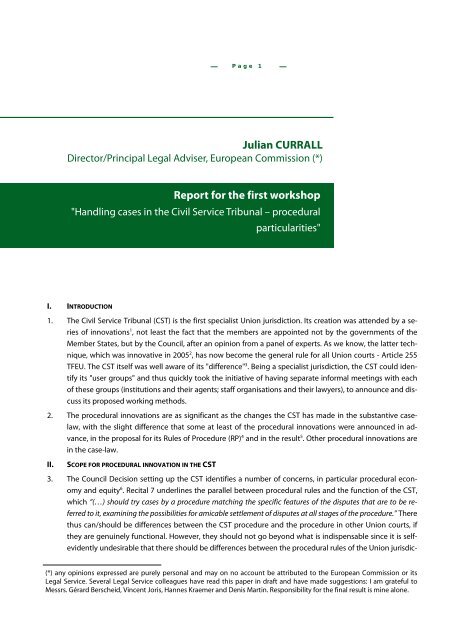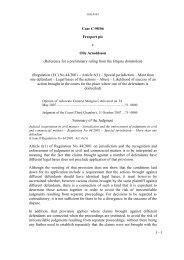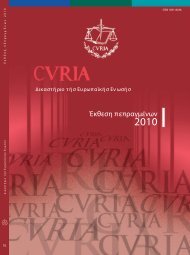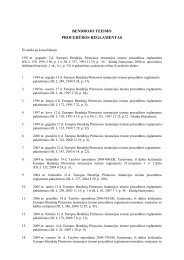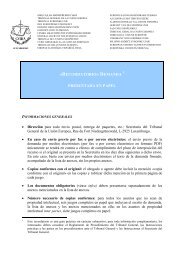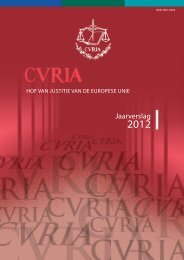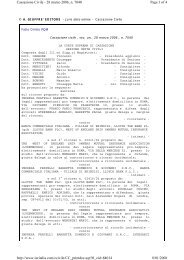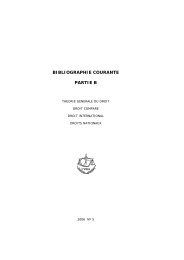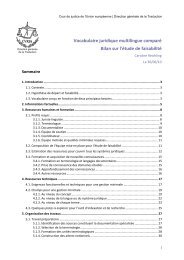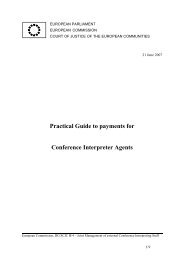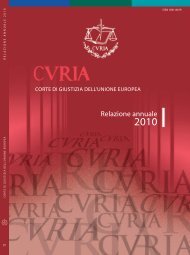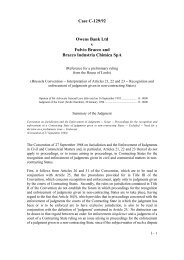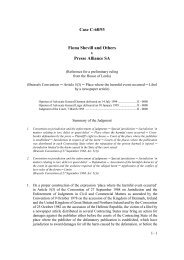Report for the first workshop Julian CURRALL - Cour de justice
Report for the first workshop Julian CURRALL - Cour de justice
Report for the first workshop Julian CURRALL - Cour de justice
Create successful ePaper yourself
Turn your PDF publications into a flip-book with our unique Google optimized e-Paper software.
I. INTRODUCTION<br />
Page 1<br />
<strong>Julian</strong> <strong>CURRALL</strong><br />
Director/Principal Legal Adviser, European Commission (*)<br />
<strong>Report</strong> <strong>for</strong> <strong>the</strong> <strong>first</strong> <strong>workshop</strong><br />
"Handling cases in <strong>the</strong> Civil Service Tribunal – procedural<br />
particularities"<br />
1. The Civil Service Tribunal (CST) is <strong>the</strong> <strong>first</strong> specialist Union jurisdiction. Its creation was atten<strong>de</strong>d by a series<br />
of innovations 1 , not least <strong>the</strong> fact that <strong>the</strong> members are appointed not by <strong>the</strong> governments of <strong>the</strong><br />
Member States, but by <strong>the</strong> Council, after an opinion from a panel of experts. As we know, <strong>the</strong> latter technique,<br />
which was innovative in 2005 2 , has now become <strong>the</strong> general rule <strong>for</strong> all Union courts - Article 255<br />
TFEU. The CST itself was well aware of its "difference" 3 . Being a specialist jurisdiction, <strong>the</strong> CST could i<strong>de</strong>ntify<br />
its "user groups" and thus quickly took <strong>the</strong> initiative of having separate in<strong>for</strong>mal meetings with each<br />
of <strong>the</strong>se groups (institutions and <strong>the</strong>ir agents; staff organisations and <strong>the</strong>ir lawyers), to announce and discuss<br />
its proposed working methods.<br />
2. The procedural innovations are as significant as <strong>the</strong> changes <strong>the</strong> CST has ma<strong>de</strong> in <strong>the</strong> substantive caselaw,<br />
with <strong>the</strong> slight difference that some at least of <strong>the</strong> procedural innovations were announced in advance,<br />
in <strong>the</strong> proposal <strong>for</strong> its Rules of Procedure (RP) 4 and in <strong>the</strong> result 5 . O<strong>the</strong>r procedural innovations are<br />
in <strong>the</strong> case-law.<br />
II. SCOPE FOR PROCEDURAL INNOVATION IN THE CST<br />
3. The Council Decision setting up <strong>the</strong> CST i<strong>de</strong>ntifies a number of concerns, in particular procedural economy<br />
and equity 6 . Recital 7 un<strong>de</strong>rlines <strong>the</strong> parallel between procedural rules and <strong>the</strong> function of <strong>the</strong> CST,<br />
which “(…) should try cases by a procedure matching <strong>the</strong> specific features of <strong>the</strong> disputes that are to be referred<br />
to it, examining <strong>the</strong> possibilities <strong>for</strong> amicable settlement of disputes at all stages of <strong>the</strong> procedure.” There<br />
thus can/should be differences between <strong>the</strong> CST procedure and <strong>the</strong> procedure in o<strong>the</strong>r Union courts, if<br />
<strong>the</strong>y are genuinely functional. However, <strong>the</strong>y should not go beyond what is indispensable since it is selfevi<strong>de</strong>ntly<br />
un<strong>de</strong>sirable that <strong>the</strong>re should be differences between <strong>the</strong> procedural rules of <strong>the</strong> Union jurisdic-<br />
(*) any opinions expressed are purely personal and may on no account be attributed to <strong>the</strong> European Commission or its<br />
Legal Service. Several Legal Service colleagues have read this paper in draft and have ma<strong>de</strong> suggestions: I am grateful to<br />
Messrs. Gérard Berscheid, Vincent Joris, Hannes Kraemer and Denis Martin. Responsibility <strong>for</strong> <strong>the</strong> final result is mine alone.
Page 2<br />
tions on <strong>the</strong> same subject. This has never<strong>the</strong>less happened in some cases: see <strong>the</strong> example of <strong>the</strong> special CST<br />
procedure on admissibility discussed below.<br />
III. RULE-BASED PROCEDURAL DIFFERENCES<br />
4. The <strong>first</strong> group of differences to consi<strong>de</strong>r is those set out in <strong>the</strong> relevant legislation (Council <strong>de</strong>cision, RP) or<br />
in administrative <strong>de</strong>cisions of <strong>the</strong> CST (<strong>de</strong>cisions on internal organisation, Practice Directions to <strong>the</strong> parties).<br />
Four particular areas <strong>de</strong>serve comment.<br />
A. Special procedure <strong>for</strong> inadmissibility<br />
5. In <strong>the</strong> RP of <strong>the</strong> <strong>Cour</strong>t and <strong>the</strong> General <strong>Cour</strong>t, <strong>the</strong>re is provision <strong>for</strong> a separate objection to admissibility, but<br />
no distinction is ma<strong>de</strong> between an objection and a <strong>de</strong>fence, concerning <strong>the</strong> time-limit. In <strong>the</strong> CST's RP, <strong>the</strong><br />
time-limit <strong>for</strong> <strong>the</strong> Defence is still two months 7 , but a separate objection to admissibility has to be presented<br />
within one month 8 . There is no obvious justification <strong>for</strong> this rule in <strong>the</strong> special functions of <strong>the</strong> CST. The difference<br />
appears ra<strong>the</strong>r to reflect <strong>the</strong> legislative history: <strong>the</strong> CST's proposal <strong>for</strong> <strong>the</strong> RP did not provi<strong>de</strong> <strong>for</strong> a separate<br />
objection at all. It seems that <strong>the</strong> CST may have believed that institutions were prone to abusing <strong>the</strong> possibility<br />
9 . This was questioned in <strong>the</strong> Council and <strong>the</strong> special procedure was reinstated. However, no doubt as<br />
a compromise, it was ma<strong>de</strong> subject to a shorter time-limit. While <strong>the</strong> sort of issue which really does justify a<br />
separate procedural act can often be <strong>de</strong>tected fairly quickly (lateness; absence of prior complaint), this is not<br />
always so (absence of attackable act? confirmatory act?). However, <strong>the</strong> problem is not so much whe<strong>the</strong>r a<br />
month may or may not be enough: it is <strong>the</strong> simple fact that <strong>the</strong> rule is not <strong>the</strong> same as <strong>the</strong> one in <strong>the</strong> o<strong>the</strong>r<br />
two <strong>Cour</strong>ts. Since <strong>the</strong>re is no obvious explanation linked to <strong>the</strong> CST's different function, <strong>the</strong> rule is little more<br />
than a potential procedural trap 10 .<br />
B. Simplified written procedure<br />
6. This is ano<strong>the</strong>r case of a legislative difference: <strong>the</strong> Council Decision itself provi<strong>de</strong>s that <strong>the</strong>re is normally to be<br />
only one exchange of written pleadings. This naturally sounds like a good i<strong>de</strong>a and in many cases it actually<br />
is, but possibly less often than one might think. It is difficult not to agree with those writers12 who have<br />
pointed out that <strong>the</strong> result may be that <strong>the</strong> CST has to ask complex written questions of fact or law or both,<br />
when <strong>the</strong> points missing from <strong>the</strong> case would probably have been <strong>de</strong>alt with in a second round of pleadings<br />
had it been allowed. Likewise, <strong>the</strong> shortened written procedure may lead to more questions being asked at<br />
<strong>the</strong> hearing, or to <strong>the</strong> questions being more general than <strong>the</strong>y might have been. A second round of written<br />
pleadings can often narrow down <strong>the</strong> dispute, allowing more targeted questions13 .<br />
7. The single round of pleadings can also lead to cases taking an unexpected turn at <strong>the</strong> hearing. It may be necessary,<br />
<strong>for</strong> example, to keep <strong>the</strong> oral procedure open, and allow one of <strong>the</strong> parties time to comment in writing<br />
on matters raised at <strong>the</strong> hearing, which might however have been in <strong>the</strong> reply/rejoin<strong>de</strong>r had <strong>the</strong>re been<br />
one. It may <strong>the</strong>n be necessary to allow <strong>the</strong> o<strong>the</strong>r party to comment on those observations14 , so that in <strong>the</strong><br />
end, <strong>the</strong>re is a second round of pleadings after all – but at <strong>the</strong> wrong time.<br />
8. It might be better ei<strong>the</strong>r (i) to maintain <strong>the</strong> rule of <strong>the</strong> single pleading, but with a much higher limit on <strong>the</strong><br />
number of pages, given that some cases are objectively complex 15 or (ii) <strong>for</strong> <strong>the</strong> CST to be more open to requests<br />
<strong>for</strong> a second round – or in<strong>de</strong>ed to proposing it. That does not prevent it from indicating <strong>the</strong> matters to<br />
be covered and possibly imposing a limit on <strong>the</strong> number of pages <strong>for</strong> <strong>the</strong> second pleadings. Fur<strong>the</strong>rmore,<br />
even if <strong>the</strong> number of pages is excee<strong>de</strong>d, whe<strong>the</strong>r in <strong>the</strong> <strong>first</strong> or second round, that should not normally be a<br />
reason <strong>for</strong> asking <strong>for</strong> a shorter version. That not only <strong>de</strong>lays <strong>the</strong> proceedings but may in fact complicate<br />
<strong>the</strong>m, if <strong>the</strong> result is that matters which later turn out to be important are not properly <strong>de</strong>alt with in writing.<br />
On <strong>the</strong> contrary, even if <strong>the</strong>re is a limit on <strong>the</strong> number of pages, it is better to treat it as indicative only. By all
Page 3<br />
means penalise parties who unnecessarily complicate <strong>the</strong> case, but <strong>the</strong> sanction should be ex post, not a priori.<br />
It should be done by an appropriate award of costs, <strong>for</strong> example by or<strong>de</strong>ring even a successful party to<br />
bear part of <strong>the</strong> costs if, in <strong>the</strong> light of <strong>the</strong> final result, it turns out that some of its arguments were unnecessary<br />
or were <strong>de</strong>veloped at unreasonable length etc.. The limit on <strong>the</strong> number of pages on <strong>the</strong> o<strong>the</strong>r hand is a<br />
very blunt instrument, which may also turn out to have been applied at <strong>the</strong> wrong time.<br />
C. Settlements<br />
9. This is again a legislative difference – <strong>the</strong> rules in <strong>the</strong> RP are much more <strong>de</strong>tailed than those in <strong>the</strong> RP of <strong>the</strong><br />
General <strong>Cour</strong>t, which merely contain a passing reference to possible settlements in <strong>the</strong> provisions on measures<br />
of organisation of procedure (MOP) 16 . Some authors have explained <strong>the</strong> difference as a reflection of <strong>the</strong><br />
special context of staff disputes (because <strong>the</strong> parties need to pursue <strong>the</strong>ir long-term employment relationship<br />
after <strong>the</strong> proceedings, so anything which can promote an in<strong>for</strong>mal solution appears <strong>de</strong>sirable), which<br />
may imply that <strong>the</strong> content of a settlement can go beyond <strong>the</strong> disputed issues and may be to some extent<br />
extra-legal 17 . O<strong>the</strong>rs have suggested that <strong>the</strong> difference is only apparent, and that <strong>the</strong>se provisions are<br />
merely inten<strong>de</strong>d to ensure greater visibility of this matter, given that it is expressly mentioned in <strong>the</strong> Council<br />
Decision 18 .<br />
10. This part of <strong>the</strong> RP contains one important new provision, in Article 70: "No opinion expressed, suggestion<br />
ma<strong>de</strong>, proposal put <strong>for</strong>ward, concession ma<strong>de</strong> or document drawn up <strong>for</strong> <strong>the</strong> purposes of <strong>the</strong> amicable settlement<br />
may be relied on as evi<strong>de</strong>nce by <strong>the</strong> Tribunal or <strong>the</strong> parties in <strong>the</strong> contentious proceedings." What is new is <strong>the</strong><br />
fact that <strong>the</strong> rule is written down19 : it is of course <strong>the</strong> codification of a traditional practice, namely <strong>the</strong> concept<br />
of "without prejudice" correspon<strong>de</strong>nce and negotiations. This provision never<strong>the</strong>less adds a welcome<br />
element of transparency by laying down beyond all doubt a principle without which parties might have difficulty<br />
in consi<strong>de</strong>ring a discussion. The Commission's agents are not aware at present of any difficulties to<br />
which this provision may have given rise.<br />
11. Turning to <strong>the</strong> practical experience of settlements in <strong>the</strong> CFI, some writers have suggested <strong>the</strong> need <strong>for</strong> more<br />
<strong>de</strong>tailed provisions in <strong>the</strong> RP, <strong>for</strong> example concerning <strong>the</strong> status of <strong>the</strong> minutes of <strong>the</strong> in<strong>for</strong>mal meeting20 . On<br />
that point, <strong>the</strong> experience of <strong>the</strong> Commission's agents is essentially positive. The administration is not normally<br />
present at meetings, mainly because an administration normally needs time to consi<strong>de</strong>r any proposed<br />
solution, given <strong>the</strong> number of people involved; instead, <strong>the</strong> agent may agree ad referendum on <strong>the</strong> day and<br />
<strong>the</strong>n a short time is allowed to <strong>the</strong> administration after <strong>the</strong> meeting to indicate agreement or disagreement.<br />
In this situation, it is valuable both <strong>for</strong> <strong>the</strong> agent and <strong>the</strong> administration to have an official document from<br />
<strong>the</strong> Tribunal, indicating what happened and what is proposed. This has more weight than a <strong>de</strong>briefing by<br />
someone who was also a participant, which is always to some extent perceived as a personal account, however<br />
objective it may actually be. The minutes thus help <strong>the</strong> administration to take its <strong>de</strong>cision. Having official<br />
minutes also simplifies <strong>the</strong> meeting, at least on <strong>the</strong> administration's si<strong>de</strong>: <strong>the</strong> administration knows that it<br />
will get <strong>the</strong> Tribunal's account of <strong>the</strong> meeting and <strong>the</strong> proposal (if any), so that it can readily leave <strong>the</strong> meeting<br />
to <strong>the</strong> agent alone. Reducing <strong>the</strong> number of interlocutors normally simplifies <strong>the</strong> discussion.<br />
12. There is a link between <strong>the</strong> minutes of <strong>the</strong> meeting and <strong>the</strong> next question, namely <strong>the</strong> perception which<br />
some parties seem to have, that a judge who tries to promote a settlement is compromised if <strong>the</strong> attempt<br />
fails and <strong>the</strong> case continues 21 . On <strong>the</strong> one hand, <strong>the</strong> risk of such a perception increases, <strong>the</strong> more <strong>the</strong> judge<br />
says during <strong>the</strong> settlement about <strong>the</strong> respective strong and weak points in each party's case. On <strong>the</strong> o<strong>the</strong>r<br />
hand, <strong>the</strong> more <strong>the</strong> judge says about that, <strong>the</strong> more likely <strong>the</strong> parties are to agree to a settlement. That goes<br />
particularly <strong>for</strong> <strong>the</strong> administration, which is more likely to be impressed by a statement of <strong>the</strong> judge's views<br />
about <strong>the</strong> institution's case and <strong>the</strong> risks it may be running, if that is clearly written down in an official Tribu-
Page 4<br />
nal document – even if, as always, <strong>the</strong> view is expressed to be provisional, without prejudice to <strong>the</strong> views of<br />
<strong>the</strong> o<strong>the</strong>r members of <strong>the</strong> chamber etc.. The reporting judge thus has to strike a difficult balance between<br />
saying enough about <strong>the</strong> case to influence <strong>the</strong> parties, and saying so much about it that one or o<strong>the</strong>r will feel<br />
that <strong>the</strong> judge has compromised him/herself. The balance is all <strong>the</strong> har<strong>de</strong>r to find, given that some parties are<br />
more suspicious than o<strong>the</strong>rs and will thus interpret even <strong>the</strong> most guar<strong>de</strong>d statement by <strong>the</strong> judge as prejudice<br />
against <strong>the</strong>ir case.<br />
13. Un<strong>de</strong>r <strong>the</strong> existing RP, <strong>the</strong> judge who finds his/her objectivity impugned can of course simply withdraw on<br />
an ad hoc basis 22 or <strong>the</strong> case can be reassigned to ano<strong>the</strong>r chamber, again ad hoc. However, in <strong>the</strong> CST, <strong>the</strong>re<br />
is a practical limit to this since <strong>the</strong> Tribunal is small: if a fur<strong>the</strong>r settlement is attempted by <strong>the</strong> new <strong>for</strong>mation<br />
and fails, <strong>the</strong> same thing will happen again, and very soon one runs out of judges. There may <strong>the</strong>re<strong>for</strong>e be<br />
room <strong>for</strong> an explicit rule.<br />
14. One possibility would be to provi<strong>de</strong> <strong>for</strong> objections on this ground to be automatically disregar<strong>de</strong>d. Such a<br />
rule is not unfamiliar, since it already exists where a party attempts to object to a judge on grounds of nationality<br />
23 . A variant would be to consi<strong>de</strong>r that <strong>the</strong> objection is presumed to be unfoun<strong>de</strong>d unless <strong>the</strong> party<br />
shows good reason to think o<strong>the</strong>rwise, <strong>for</strong> example in a submission to <strong>the</strong> Presi<strong>de</strong>nt of <strong>the</strong> Tribunal <strong>for</strong> this<br />
purpose. The o<strong>the</strong>r possibility is to do <strong>the</strong> opposite: in <strong>the</strong> event of such an objection, <strong>the</strong> case is automatically<br />
transferred to ano<strong>the</strong>r chamber of <strong>the</strong> Tribunal. One could <strong>the</strong>n perhaps add a provision that no fur<strong>the</strong>r<br />
reassignment of <strong>the</strong> case is possible.<br />
D. Costs 24<br />
15. The legislative innovation here is to remove a difference between staff cases and o<strong>the</strong>rs. The Council Decision<br />
provi<strong>de</strong>s that <strong>the</strong> normal rule (i.e. <strong>the</strong> loser pays) is to apply unless <strong>the</strong> RP provi<strong>de</strong> o<strong>the</strong>rwise - and Articles 87<br />
ff. RP do not, although <strong>the</strong>y do contain an "equity clause" in Article 87(2), which seems to have been used to<br />
some extent <strong>for</strong> transitional purposes. The wording of <strong>the</strong> "equity clause" is wi<strong>de</strong>. It is not limited to <strong>the</strong> conduct<br />
of <strong>the</strong> case by <strong>the</strong> party concerned25 , but refers to general consi<strong>de</strong>rations of fairness. According to <strong>the</strong><br />
CST, that can inclu<strong>de</strong>: <strong>the</strong> fact that <strong>the</strong> matter in issue was of real importance to <strong>the</strong> official; <strong>the</strong> fact that even<br />
if <strong>the</strong> case failed in <strong>the</strong> end, it was sufficiently serious to be put to <strong>the</strong> Tribunal, or even <strong>the</strong> fact that <strong>the</strong> institution's<br />
costs were higher than usual, since it was represented by an outsi<strong>de</strong> lawyer not by its own staff26 . The<br />
latter point seems so far only to have been mentioned on this one occasion, moreover only as one consi<strong>de</strong>ration<br />
among several. On <strong>the</strong> o<strong>the</strong>r hand <strong>the</strong>re are many more recent cases where <strong>the</strong> CST has had no hesitation<br />
in or<strong>de</strong>ring <strong>the</strong> unsuccessful applicant to pay <strong>the</strong> institution's costs when it has been assisted by outsi<strong>de</strong><br />
counsel27 .<br />
16. The CST has ma<strong>de</strong> ano<strong>the</strong>r innovation, in its practice on costs. Article 94(a) RP contains a rule which can also<br />
be found in <strong>the</strong> o<strong>the</strong>r Union <strong>Cour</strong>ts' RP, that while <strong>the</strong> court procedure is free, a party who has caused <strong>the</strong><br />
court to incur costs may be or<strong>de</strong>red to pay <strong>the</strong>m28 . The intention is clearly to punish litigation which is vexatious<br />
per se, or vexatious conduct of an o<strong>the</strong>rwise normal case, over and above what can be done un<strong>de</strong>r Articles<br />
87(2) and 88. There is no limit in <strong>the</strong> <strong>Cour</strong>t of Justice or <strong>the</strong> GC, but in <strong>the</strong> CST, <strong>the</strong>re is a maximum of<br />
2000 euros. The CST is <strong>the</strong> <strong>first</strong> Union court to have applied this rule29 . There is thus still a penalty <strong>for</strong> vexatious<br />
litigants, but adapted to <strong>the</strong> new context.<br />
17. The CST's practice on costs is still <strong>de</strong>veloping. One may perhaps suggest some fur<strong>the</strong>r innovations. Some<br />
staff cases are objectively complex, o<strong>the</strong>rs are "complexified" by one or both of <strong>the</strong> parties. For <strong>the</strong> latter<br />
situation, consi<strong>de</strong>ration could be given to following <strong>the</strong> General <strong>Cour</strong>t's lead in penalising parties who use<br />
arguments which turn out, once <strong>the</strong> case is <strong>de</strong>ci<strong>de</strong>d, to have been pointless – particularly if <strong>the</strong>y have also<br />
generated numerous annexes etc. A party can thus be or<strong>de</strong>red to pay all or some of <strong>the</strong> costs <strong>de</strong>emed to be
Page 5<br />
related to those matters. On <strong>the</strong> o<strong>the</strong>r hand, one would not wish to see <strong>the</strong> CST follow <strong>the</strong> General <strong>Cour</strong>t's<br />
occasional practice of dividing <strong>the</strong> costs, not by or<strong>de</strong>ring each to bear its own, but by or<strong>de</strong>ring each to bear a<br />
proportion of <strong>the</strong> o<strong>the</strong>r si<strong>de</strong>'s costs 30 . Of course, <strong>the</strong> problem of applicants who are liable to have huge costs<br />
is less acute in <strong>the</strong> CST than in <strong>the</strong> General <strong>Cour</strong>t, since <strong>the</strong> CST has no heavy commercial cases (competition,<br />
state aids). Never<strong>the</strong>less, certain collective staff actions may be very expensive 31 . The Microsoft division of<br />
costs can have perverse effects where <strong>the</strong> institution is represented by its own agents, given <strong>the</strong> case-law 32<br />
which limits recoverable costs in such a case to <strong>the</strong> cost of one agent's mission to attend <strong>the</strong> hearing, to <strong>the</strong><br />
exclusion of costs of employing <strong>the</strong> person. The institution's recoverable costs are thus likely to be about 250<br />
euros – which bears little relation to <strong>the</strong> likely amount represented by 20% of Microsoft's costs <strong>for</strong> its team of<br />
lawyers, to take just that example.<br />
IV. PROCEDURAL DIFFERENCES RESULTING FROM JUDICIAL INTERPRETATION<br />
18. The case-law occasionally suggests a certain evolution in <strong>the</strong> CST concerning <strong>the</strong> rules on evi<strong>de</strong>nce and <strong>the</strong><br />
bur<strong>de</strong>n of proof. The matter will be consi<strong>de</strong>red here in connection with two particular issues: (1) <strong>the</strong> status of<br />
measures of organisation of procedure (MOP) and measures of inquiry (MI) in <strong>the</strong> CST – is <strong>the</strong>re any appreciable<br />
difference between <strong>the</strong> CST and <strong>the</strong> General <strong>Cour</strong>t? (2) <strong>the</strong> oft-repeated argument that <strong>the</strong> administration<br />
should disclose its "administrative file" to <strong>the</strong> CST.<br />
1. Measures of organisation of procedure and measures of inquiry<br />
19. On <strong>the</strong> face of it, <strong>the</strong>re is a difference between <strong>the</strong> RP and <strong>the</strong> RP of <strong>the</strong> General <strong>Cour</strong>t: Article 57 RP CST, on<br />
MI, refers only to third parties, whereas Article 65 RP GC clearly also allows MI to be addressed to <strong>the</strong> parties<br />
<strong>the</strong>mselves.<br />
20. It only became apparent during <strong>the</strong> proceedings in Meierhofer33 that <strong>the</strong> Commission and <strong>the</strong> CST disagreed<br />
about <strong>the</strong> scope of <strong>the</strong>se rules. The issue was whe<strong>the</strong>r <strong>the</strong> Commission should disclose certain material<br />
which in its view was covered by <strong>the</strong> obligation of secrecy attaching to <strong>the</strong> work of a selection board un<strong>de</strong>r<br />
Annex III to <strong>the</strong> Staff Regulations (SR). The CST had invited it to do so, by sending it an MOP. The Commission<br />
consi<strong>de</strong>red that <strong>for</strong> it to be bound to disclose material covered by a statutory obligation of secrecy, it had to<br />
receive an MI, so it said that it would produce <strong>the</strong> in<strong>for</strong>mation, but only if it received such a measure. This<br />
view was based on <strong>the</strong> assumption that <strong>the</strong>re was no substantive difference between <strong>the</strong> RP and <strong>the</strong> RP GC<br />
on this point. The distinction between MOP and MI <strong>the</strong>re<strong>for</strong>e concerned <strong>the</strong> nature of <strong>the</strong> measure: an MOP<br />
was consensual, but an MI was binding. The Commission had <strong>the</strong>re<strong>for</strong>e assumed that <strong>the</strong> GC's case-law still<br />
applied, according to which an MI (but not an MOP) required <strong>the</strong> party requesting it to provi<strong>de</strong> at least some<br />
indication that <strong>the</strong> matter to be investigated did exist34 . According to <strong>the</strong> Commission, Mr Meierhofer had<br />
not satisfied this bur<strong>de</strong>n of proof. The CST however consi<strong>de</strong>red that Article 57 RP did not allow it to address<br />
an MI to <strong>the</strong> parties, who could only receive an MOP. Article 57, it thought, only concerned third parties. It<br />
thus conclu<strong>de</strong>d that <strong>the</strong> Commission, by refusing (in its view) to produce <strong>the</strong> in<strong>for</strong>mation, had failed to show<br />
that <strong>the</strong> contested <strong>de</strong>cision was correctly motivated, and annulled it.<br />
21. The General <strong>Cour</strong>t upheld <strong>the</strong> Commission's appeal, but <strong>for</strong> slightly different reasons. It recognised that <strong>the</strong>re<br />
was no explicit legal basis in <strong>the</strong> RP CST <strong>for</strong> MI addressed to <strong>the</strong> parties. It held however, that an or<strong>de</strong>r to a<br />
party could be ma<strong>de</strong> un<strong>de</strong>r Article 44(2) RP instead, since Article 56 RP, concerning MOP, states that it is without<br />
prejudice to that provision. The effect is that <strong>the</strong>re is no significant difference between <strong>the</strong> GC and <strong>the</strong><br />
CST when an institution claims confi<strong>de</strong>ntiality <strong>for</strong> certain documents. It follows that an or<strong>de</strong>r apparently<br />
equivalent to an MI can be addressed to <strong>the</strong> <strong>de</strong>fendant institution. Given <strong>the</strong> nature of <strong>the</strong> dispute in Meierhofer,<br />
<strong>the</strong> necessary <strong>de</strong>duction from this is that, like an MI, such an or<strong>de</strong>r is binding on <strong>the</strong> party addressed<br />
and thus also requires <strong>the</strong> person asking <strong>for</strong> it to discharge a bur<strong>de</strong>n of proof of <strong>the</strong> kind indicated in Fiata-
Page 6<br />
gri35 . This cannot be seen as an improper restriction on officials' recourse to <strong>justice</strong>: it is simply <strong>the</strong> ordinary<br />
rule of evi<strong>de</strong>nce in administrative law. .<br />
22. Practical experience in o<strong>the</strong>r cases shows that <strong>the</strong> existing rules on bur<strong>de</strong>n of proof do not prevent effective<br />
judicial scrutiny of confi<strong>de</strong>ntial in<strong>for</strong>mation. A useful example is Matos Martins36 , which concerned a selection<br />
procedure <strong>for</strong> contract agents (to which Annex III SR does not apply). The candidates could sit <strong>the</strong> test at a<br />
time of <strong>the</strong>ir choice during a period of several weeks. To protect <strong>the</strong> objectivity of <strong>the</strong> test and ensure equal<br />
treatment of candidates, <strong>the</strong> questions <strong>the</strong>re<strong>for</strong>e could not be <strong>the</strong> same <strong>for</strong> all candidates. Instead, candidates<br />
had to answer <strong>the</strong> same number of questions, but <strong>the</strong> individual questions were taken at random from<br />
a database in which <strong>the</strong>y had been quality-gra<strong>de</strong>d to ensure that all questions in a given "difficulty group"<br />
were of comparable difficulty. The difficulty group varied according to <strong>the</strong> contract agent function group <strong>for</strong><br />
which <strong>the</strong> candidate was applying. The applicant questioned <strong>the</strong> appropriateness of <strong>the</strong> questions put to<br />
him in his test. The CST thus had to check that <strong>the</strong> questions were not manifestly inappropriate37 and that <strong>the</strong><br />
principle of equal treatment had not been infringed. It <strong>the</strong>re<strong>for</strong>e had to see <strong>the</strong> questions actually put to <strong>the</strong><br />
candidate. However, this gave rise to an issue of confi<strong>de</strong>ntiality, because <strong>the</strong> database (which comprised<br />
thousands of questions) was to be recycled in future procedures too, including <strong>the</strong> questions put to <strong>the</strong> applicant.<br />
They could thus not be disclosed to him without compromising <strong>the</strong> individual questions – and if<br />
<strong>the</strong>re were more applications of <strong>the</strong> same kind, with o<strong>the</strong>r candidates also asking <strong>for</strong> disclosure of "<strong>the</strong>ir"<br />
questions, in <strong>the</strong> end, <strong>the</strong> entire database would be compromised. The CST however accepted <strong>the</strong> Commission's<br />
proposal <strong>for</strong> a special procedure, un<strong>de</strong>r which <strong>the</strong> questions were be given to <strong>the</strong> Tribunal and <strong>the</strong> applicant's<br />
lawyer (but not <strong>the</strong> applicant himself) was invited to inspect <strong>the</strong>m at <strong>the</strong> Registry, without taking<br />
copies38 , and <strong>the</strong>n to make written submissions on <strong>the</strong>m. Having obtained <strong>the</strong> CST's agreement <strong>for</strong> <strong>the</strong>se<br />
precautions, <strong>the</strong> Commission disclosed <strong>the</strong> material on <strong>the</strong> basis of an MOP and <strong>the</strong>re was no need to consi<strong>de</strong>r<br />
whe<strong>the</strong>r a MI was nee<strong>de</strong>d.<br />
2. Production of <strong>the</strong> "administrative file"?<br />
23. It has sometimes been suggested that officials are in a weak evi<strong>de</strong>ntial position in staff cases, as compared to<br />
<strong>the</strong> administration and that this should be redressed by requiring <strong>the</strong> <strong>de</strong>fendant to produce <strong>the</strong><br />
"administrative file" automatically to <strong>the</strong> <strong>Cour</strong>t, whenever a case is brought 39 . It has been suggested that Article<br />
55 RP, concerning MOP 40 , already allows <strong>the</strong> CST to obtain this "file" by means of an ad hoc request.<br />
24. This argument is an implicit recognition that <strong>the</strong>re is no express requirement of this kind in <strong>the</strong> RP, in particular<br />
not a requirement <strong>for</strong> automatic production of "<strong>the</strong> file". There is certainly no such requirement in Article<br />
39 (which lays down <strong>the</strong> minimum content of <strong>the</strong> <strong>de</strong>fence). In<strong>de</strong>ed, fur<strong>the</strong>r doubt is cast on <strong>the</strong> argument<br />
when one remembers that <strong>the</strong> RP CST have not reproduced <strong>the</strong> requirement on <strong>the</strong> <strong>de</strong>fendant un<strong>de</strong>r Article<br />
46(2) RP GC to produce <strong>the</strong> complaint and <strong>the</strong> <strong>de</strong>cision rejecting it and indicate <strong>the</strong> dates when <strong>the</strong> complaint<br />
was submitted and <strong>the</strong> <strong>de</strong>cision notified. Moreover, one could <strong>de</strong>duce from <strong>the</strong> fact that that was all<br />
<strong>the</strong> RP GC required, that <strong>the</strong>re was no requirement to produce a complete "file". In a situation where <strong>the</strong> RP<br />
CST actually require even less than <strong>the</strong> RP GC, it is difficult to see how it can be suggested that <strong>the</strong>y in fact<br />
require more.<br />
25. The same <strong>de</strong>duction may be ma<strong>de</strong> from <strong>the</strong> often-overlooked fact that <strong>the</strong>re used to be a provision requiring<br />
production of <strong>the</strong> file, but that it was confined to one Treaty and was not reproduced <strong>for</strong> cases concerning<br />
<strong>the</strong> o<strong>the</strong>r Treaties. This was Article 23 of <strong>the</strong> ECSC Statute of <strong>the</strong> <strong>Cour</strong>t: "Lorsqu’un recours est <strong>for</strong>mé contre une<br />
décision prise par une <strong>de</strong>s institutions <strong>de</strong> la Communauté, cette institution est tenue <strong>de</strong> transmettre à la <strong>Cour</strong><br />
toutes les pièces relatives à l’affaire qui est portée <strong>de</strong>vant elle." However, that provision was not carried over into<br />
<strong>the</strong> EC and Euratom Statutes. This cannot have been a mistake. And now, of course, <strong>the</strong> ECSC Statute has dis-
appeared.<br />
Page 7<br />
26. There is perhaps an even more cogent indication, namely that nothing in <strong>the</strong> Council Decision setting up <strong>the</strong><br />
CST indicates that <strong>the</strong> Council had <strong>the</strong> least intention of changing <strong>the</strong> existing rule on bur<strong>de</strong>n of proof, which<br />
was simply <strong>the</strong> ordinary rule of administrative law, that in <strong>the</strong> absence of an express exception, <strong>the</strong> applicant<br />
has <strong>the</strong> bur<strong>de</strong>n of proof in any challenge to an administrative <strong>de</strong>cision. The fact that <strong>the</strong> CST is a specialist<br />
court is certainly not a reason <strong>for</strong> assuming <strong>the</strong> legislature inten<strong>de</strong>d any change in this respect 41 .<br />
27. It follows that <strong>the</strong>re can be no question of producing "<strong>the</strong> file" systematically un<strong>de</strong>r <strong>the</strong> current rules. A<br />
change in <strong>the</strong> RP would be nee<strong>de</strong>d. The question is <strong>the</strong>n whe<strong>the</strong>r <strong>the</strong>re is any merit in such a change. There<br />
are in fact strong reasons <strong>for</strong> thinking that <strong>the</strong>re is none.<br />
28. The <strong>first</strong> reason is existential: what is "<strong>the</strong> file"? That is by no means obvious. For example, what is "<strong>the</strong> file" in<br />
relation to a complainant in a case of alleged harassment? The inquiry, if <strong>the</strong>re is one, does not concern <strong>the</strong><br />
complainant at all, but <strong>the</strong> supposed harasser – and many third parties will have given evi<strong>de</strong>nce. The file is<br />
not built up in relation to <strong>the</strong> complainant. If it "concerns" anyone, it is probably <strong>the</strong> person complained of.<br />
There may in<strong>de</strong>ed be many physical "files" in such a case: <strong>the</strong> file of <strong>the</strong> request and <strong>the</strong> complaint, but also a<br />
separate inquiry file and possibly even a disciplinary file, if <strong>the</strong> matter goes to that stage. Which one are we<br />
talking about? And if it is all of <strong>the</strong>m, <strong>the</strong> fact is that <strong>the</strong>y are not – or at any rate were never conceived as –<br />
"<strong>the</strong> file" relating to <strong>the</strong> applicant. That cannot be so, since one does not know in advance who is going to<br />
bring an action, or what <strong>the</strong> action will be: so how can <strong>the</strong>re be a pre<strong>de</strong>termined "file" about it? Moreover,<br />
<strong>the</strong> person who wants to see "<strong>the</strong> file" may in fact have no recognised legal interest in <strong>the</strong> case at all42 . If that<br />
is so, still less can that person have a claim to see "<strong>the</strong> file", even assuming one can i<strong>de</strong>ntify it.<br />
29. Second, <strong>the</strong> argument seems to be based on a reductionist view of staff litigation, as a vertical issue between<br />
a single official and an all-powerful bureaucracy. While that may often be <strong>the</strong> case, <strong>the</strong> reality is frequently<br />
very different: many situations are not vertical at all, <strong>the</strong>y are horizontal, triangular, multilateral etc. A request<br />
<strong>for</strong> assistance un<strong>de</strong>r Article 24 SR <strong>for</strong> protection against alleged harassment (cf article 12a SR) puts <strong>the</strong> administration<br />
in a position which is much more that of an arbitrator, who has to <strong>de</strong>al with a conflict between<br />
two third parties. Such a case raises obvious issues of evi<strong>de</strong>nce and of staff policy: if <strong>the</strong>re is a proven problem,<br />
who should be moved, and where? Cases may involve many actors. There are not only <strong>the</strong> complainant<br />
and <strong>the</strong> alleged harasser, but all <strong>the</strong> witnesses, who may want anonymity. All this material might be said to<br />
<strong>for</strong>m part of "<strong>the</strong> file", but <strong>the</strong>re are excellent reasons <strong>for</strong> not disclosing all of it – at least not to <strong>the</strong> applicant.<br />
30. Third, who is <strong>the</strong> file <strong>for</strong>? Those who argue <strong>for</strong> producing it recognise that <strong>the</strong>re is a difference between giving<br />
it to <strong>the</strong> judge and disclosing it to <strong>the</strong> applicant. That is certainly so and <strong>the</strong>re is authority to that effect in<br />
one of <strong>the</strong> only cases <strong>de</strong>ci<strong>de</strong>d in a context where <strong>the</strong> administration was obliged to produce <strong>the</strong> file, namely<br />
an ECSC competition case falling un<strong>de</strong>r Article 23 ECSC Statute of <strong>the</strong> <strong>Cour</strong>t (see above). The CFI's Or<strong>de</strong>r confirms<br />
that <strong>the</strong> purpose of this provision was to in<strong>for</strong>m <strong>the</strong> judge and that what <strong>the</strong> applicant sees is an entirely<br />
different matter 43 . The CFI refused access to most of <strong>the</strong> internal documents, o<strong>the</strong>r than those which<br />
might have some bearing on <strong>the</strong> arguments already put <strong>for</strong>ward in <strong>the</strong> case 44 . One may won<strong>de</strong>r whe<strong>the</strong>r<br />
from <strong>the</strong> applicants' point of view this result was in any way different to what would have happened in an EC<br />
competition case, on <strong>the</strong> basis of an MOP or an MI. We have already seen what was done in Matos Martins,<br />
without anyone ever automatically producing "<strong>the</strong> file". In reality, <strong>the</strong> issue is not getting "<strong>the</strong> file", even if<br />
one can i<strong>de</strong>ntify it: it is getting <strong>the</strong> right in<strong>for</strong>mation, and that can be done within <strong>the</strong> existing rules, as that<br />
case shows.
Page 8<br />
V. A NEW PROCEDURAL ISSUE – EX OFFICIO PLEAS RAISED BY THE CST 45<br />
31. The CST has shown an interest in this matter which seems to go beyond <strong>the</strong> previous prece<strong>de</strong>nts in <strong>the</strong> o<strong>the</strong>r<br />
Union courts. The normal rule is that <strong>the</strong> applicant bears <strong>the</strong> bur<strong>de</strong>n of (a) i<strong>de</strong>ntifying <strong>the</strong> plea he relies on;<br />
(b) adducing <strong>the</strong> arguments to support it and (c) proving with appropriate evi<strong>de</strong>nce that those arguments<br />
are factually correct. However, if <strong>the</strong> judge can raise a plea of his own motion and uphold it, <strong>the</strong> result is in<br />
effect to overturn <strong>the</strong> normal rule. The applicant does not even have to raise <strong>the</strong> plea, still less substantiate it<br />
– <strong>the</strong> judge does it <strong>for</strong> him. Thus, if we regard <strong>the</strong> bur<strong>de</strong>n of proof as a procedural rule, a <strong>for</strong>tiori ex officio<br />
pleas are a procedural issue too.<br />
32. Making <strong>the</strong> connection between bur<strong>de</strong>n of proof and ex officio pleas raises <strong>the</strong> following question: since <strong>the</strong><br />
Council did not intend to alter <strong>the</strong> bur<strong>de</strong>n of proof in staff cases when it set up <strong>the</strong> CST, is <strong>the</strong>re really room<br />
<strong>for</strong> ex officio pleas of "internal legality", whose effect is far more radical than changing <strong>the</strong> bur<strong>de</strong>n of proof?<br />
33. It is well-established that certain pleas can be raised ex officio: inadmissibility is in a category of its own, since<br />
it goes to <strong>the</strong> <strong>Cour</strong>t's jurisdiction. The o<strong>the</strong>r generally-recognised cases are lack of reasoning and lack of jurisdiction<br />
in <strong>the</strong> <strong>de</strong>ciding authority ("incompétence") 46 , which are often i<strong>de</strong>ntified as matters of "external legality"<br />
(i.e. what is <strong>de</strong>tectable merely by looking at <strong>the</strong> <strong>de</strong>cision). The current dispute which has been highlighted<br />
by certain CST judgments47 , is about whe<strong>the</strong>r ex officio pleas can also concern "internal legality". The<br />
most controversial question is probably whe<strong>the</strong>r Union law recognises <strong>the</strong> plea of "méconnaissance du<br />
champ d'application <strong>de</strong> la loi" 48 , which can mean, <strong>for</strong> example, that <strong>the</strong> judge raises of his own motion <strong>the</strong><br />
possibility that a given <strong>de</strong>cision infringes this or that provision of <strong>the</strong> SR, even if <strong>the</strong> applicant has never mentioned<br />
it.<br />
34. Up to 2004, <strong>the</strong>re seems to be only one example of this latter type of ex officio plea in <strong>the</strong> Community/Union<br />
courts 49 . However, <strong>the</strong> background to <strong>the</strong> case suggests what <strong>the</strong> true explanation is. It was a tra<strong>de</strong> union<br />
case with implications <strong>for</strong> huge numbers of officials and which arose out of a serious and long-running collective<br />
employment conflict – <strong>the</strong> applicants were contesting <strong>the</strong> Commission's <strong>de</strong>cision to withhold pay<br />
following a strike in <strong>the</strong> early 1990s. The applicants claimed that <strong>the</strong> Commission had infringed <strong>the</strong> collective<br />
agreement which it had conclu<strong>de</strong>d with <strong>the</strong> tra<strong>de</strong> unions. The Commission claimed that <strong>the</strong> applicants' argument<br />
was <strong>de</strong>void of purpose, since such agreements could not create individual rights. The CFI did not just<br />
examine this point, but also consi<strong>de</strong>red ex officio <strong>the</strong> question whe<strong>the</strong>r <strong>the</strong>re could in fact have been a<br />
breach of <strong>the</strong> collective agreement. The interesting point in Browet is that <strong>the</strong> CFI raised <strong>the</strong> plea of<br />
"méconnaissance du champ d'application <strong>de</strong> la loi" of its own motion, and rejected it 50 . The most likely explanation<br />
of <strong>the</strong> case is <strong>the</strong>re<strong>for</strong>e that <strong>the</strong> CFI wanted to dispose of <strong>the</strong> litigation arising out of <strong>the</strong> strikes once and<br />
<strong>for</strong> all. Not raising <strong>the</strong> plea would have left both si<strong>de</strong>s (i.e. <strong>the</strong> institution and all its staff) in a state of uncertainty<br />
on a matter of general importance (whe<strong>the</strong>r strike action necessarily leads to withholding of pay, irrespective<br />
of any collective agreement) and would have left open <strong>the</strong> possibility of future litigation to resolve<br />
<strong>the</strong> issue raised ex officio. This is a very different situation from those which have arisen more recently, in<br />
which a plea has been raised ex officio, and upheld.<br />
35. The most recent judgment, in Putterie-De Beukelaar (above), leaves <strong>the</strong> matter open 51 . The case concerned a<br />
staff report and <strong>the</strong> question whe<strong>the</strong>r <strong>the</strong> applicant had shown potential to move to a higher function group.<br />
The CST upheld <strong>the</strong> applicant's case, after raising of its own motion <strong>the</strong> plea of "méconnaissance du champ<br />
d'application <strong>de</strong> la loi", on which it invited <strong>the</strong> parties to submit observations. The plea concerned <strong>the</strong> question<br />
whe<strong>the</strong>r <strong>the</strong> matter was governed by Article 43 SR or Article 10(3) of Annex XIII. The GC upheld <strong>the</strong> Commission's<br />
appeal, but on grounds related to <strong>the</strong> implementing provisions <strong>for</strong> Article 43. The Commission's<br />
primary ground of appeal, concerning ex officio pleas, was rejected. It is however interesting to note that <strong>the</strong>
Page 9<br />
GC does not say that <strong>the</strong> CST was right to raise a plea of "méconnaissance du champ d'application <strong>de</strong> la loi".<br />
Instead, it says that it was entitled to raise an ex officio plea, which could be consi<strong>de</strong>red in this case to be a<br />
plea of lack of jurisdiction ("incompétence") and of infringement of an essential procedural requirement –<br />
which are known categories of ex officio pleas.<br />
36. Recently, <strong>the</strong> <strong>Cour</strong>t of Justice has again expressly rejected <strong>the</strong> i<strong>de</strong>a of ex officio pleas concerning "internal<br />
legality" 53 . This need not necessarily be regar<strong>de</strong>d as an absolute bar to o<strong>the</strong>r Union courts attempting to apply<br />
<strong>the</strong> concept, particularly if <strong>the</strong>y exercise a specialised jurisdiction. However, if <strong>the</strong> i<strong>de</strong>a is one which <strong>the</strong><br />
<strong>Cour</strong>t will not entertain, in relation to Member States, institutions and Community citizens in general, it<br />
might be thought surprising to allow it in <strong>the</strong> CST, in relation to Community officials and agents alone. This<br />
category of litigants would thus have a privilege enjoyed by no o<strong>the</strong>r Community citizens – and this at a time<br />
when <strong>the</strong> legislature has just removed such a privilege, namely <strong>the</strong> old rule on costs.<br />
37. Ex officio pleas undoubtedly have a part to play in a system of administrative <strong>justice</strong> where no legal representation<br />
at all is required – e.g. staff cases in French administrative courts (unless <strong>the</strong> claim is financial) 54 . There<br />
is much to be said <strong>for</strong> <strong>the</strong> i<strong>de</strong>a that a party who is <strong>de</strong>fending himself and has a good case should not suffer<br />
because he is not a lawyer and has not i<strong>de</strong>ntified <strong>the</strong> right argument: if <strong>the</strong> judge can see <strong>the</strong> right argument,<br />
why should he not raise it himself and get <strong>the</strong> right result?<br />
38. The problem is that <strong>the</strong> Union legal system, including <strong>the</strong> CST, has always required parties to be represented<br />
by a lawyer; no exception was ma<strong>de</strong> <strong>for</strong> staff cases when <strong>the</strong> CST was established. Article 19, third paragraph,<br />
of <strong>the</strong> <strong>Cour</strong>t's Statute, still applies. This is a <strong>de</strong>liberate choice by <strong>the</strong> Council: <strong>the</strong>re was once a proposal to set<br />
up a staff tribunal which would have been more like a labour court (bipartisan membership with a judicial<br />
chairman) 55 . In a system of that kind, one might well have consi<strong>de</strong>red dropping <strong>the</strong> requirement <strong>for</strong> legal<br />
representation, because that is how labour courts operate in many Member States. However, in 2004, <strong>the</strong><br />
Council expressly chose to create a judicial tribunal. In that context, it is hardly surprising that it maintained<br />
<strong>the</strong> requirement <strong>for</strong> applicants to have legal representation. This has to be un<strong>de</strong>rstood as limiting <strong>the</strong> scope<br />
<strong>for</strong> <strong>the</strong> judge to step in to help a party who has not i<strong>de</strong>ntified <strong>the</strong> right argument. It is up to <strong>the</strong> party's lawyer<br />
to find <strong>the</strong> right arguments – that is one of <strong>the</strong> reasons why <strong>the</strong> Statute requires his/her presence.<br />
VI. A MODEST PROPOSAL – DEALING WITH VEXATIOUS LITIGANTS<br />
39. The CST is <strong>the</strong> third stage in a series of transfers of jurisdiction <strong>for</strong> staff cases. Twice, this jurisdiction has been<br />
transferred, essentially to lessen <strong>the</strong> bur<strong>de</strong>n on <strong>the</strong> higher court which had previously exercised it. There is of<br />
course little point in lightening <strong>the</strong> bur<strong>de</strong>n on <strong>the</strong> higher court, if <strong>the</strong> resulting <strong>de</strong>lays do not change, <strong>for</strong> example<br />
because <strong>the</strong> new court is <strong>de</strong>luged with a series of pointless cases. Vexatious cases cause <strong>de</strong>lay to more<br />
<strong>de</strong>serving cases brought by o<strong>the</strong>rs. The effects of vexatious litigation in <strong>the</strong> Union courts are compoun<strong>de</strong>d<br />
by <strong>the</strong> fact that over and above <strong>the</strong> necessary minimum of work nee<strong>de</strong>d to <strong>de</strong>al with <strong>the</strong> case, everything in<br />
<strong>the</strong> vexatious proceedings usually has to be translated too.<br />
40. The CST in fact turns cases around fairly quickly, as its published statistics show. It is not unusual <strong>for</strong> judgment<br />
to be given in <strong>the</strong> year of which <strong>the</strong> case bears <strong>the</strong> number 56 . Never<strong>the</strong>less, this positive result will be<br />
put at risk if some individuals are allowed a free hand. This risk is not entirely fanciful: to take just one example,<br />
a single individual accounts <strong>for</strong> <strong>the</strong> following proportion of <strong>the</strong> CST's work:<br />
- 7 cases brought in 2006 / 148 (4.7 %)<br />
- 9 cases brought in 2007 / 147 (6.1 %)<br />
- 5 cases brought in 2008 / 104 (4.8 %)<br />
- 6 cases brought in 2009 / 106 (5.7 %)
Page 10<br />
- 5 cases brought in 2010 to date / 68 (7.4 %)<br />
Most of <strong>the</strong>se cases have been dismissed by an or<strong>de</strong>r <strong>de</strong>claring <strong>the</strong>m manifestly inadmissible or unfoun<strong>de</strong>d;<br />
o<strong>the</strong>rs have been rejected by a final judgment. In a very few, <strong>the</strong> applicant has succee<strong>de</strong>d. The cases he has<br />
lost in <strong>the</strong> CST he has systematically appealed – with similar results, so far, in <strong>the</strong> General <strong>Cour</strong>t. There are<br />
one or two o<strong>the</strong>r serial litigants but <strong>the</strong>y are currently well behind in <strong>the</strong> number of cases brought.<br />
41. The CST is well aware of <strong>the</strong> problem, as it is in <strong>the</strong> front line. It has gone fur<strong>the</strong>r than any o<strong>the</strong>r Union jurisdiction<br />
in <strong>de</strong>aling with vexatious cases: as stated above, it has already applied <strong>the</strong> provision in its RP allowing<br />
it to or<strong>de</strong>r a party to pay part of <strong>the</strong> Tribunal's own costs. Even be<strong>for</strong>e <strong>the</strong>n, at least one member of <strong>the</strong><br />
Tribunal had mentioned vexatious litigants in a published article, which referred to "l'objectif du législateur <strong>de</strong><br />
limiter les excès <strong>de</strong> quérulence <strong>de</strong> certains fonctionnaires" 57 . That comment was in relation to <strong>the</strong> change in <strong>the</strong><br />
costs rules <strong>for</strong> staff cases. However, <strong>the</strong> new rule came into effect in November 2007 and has not discouraged<br />
some people – and it seems that perhaps even <strong>the</strong> new practice of making <strong>the</strong>m pay <strong>Cour</strong>t costs may<br />
not be enough.<br />
42. Articles 87(2) and 88 RP are not <strong>the</strong> answer – those provisions concern successful parties who cause unjustified<br />
costs to <strong>the</strong> o<strong>the</strong>r party. The present problem concerns unsuccessful parties, whose actions are dismissed,<br />
yet go on bringing cases on more or less <strong>the</strong> same subject, and are not <strong>de</strong>terred by losing or being<br />
or<strong>de</strong>red to pay <strong>the</strong> costs.<br />
43. So, what more can be done? There is certainly nothing wrong in principle with measures to limit abuse of<br />
<strong>the</strong> process, so long as <strong>the</strong>y are <strong>de</strong>ci<strong>de</strong>d by <strong>the</strong> judge. For example, <strong>the</strong> EHCR can <strong>de</strong>clare an application inadmissible<br />
if it appears to be an abuse of <strong>the</strong> process– a much wi<strong>de</strong>r-ranging provision than anything in <strong>the</strong><br />
Union courts' repertoire 58 . The EHCR has recently ma<strong>de</strong> use of this provision, in a case where a person with<br />
an a<strong>de</strong>quate income complained about non-reimbursement of a trifling sum of medical expenses 59 . It emphasised<br />
that vexatious cases were one of <strong>the</strong> main reasons <strong>for</strong> <strong>the</strong> <strong>de</strong>lays in national courts which had led<br />
to many cases of unreasonable <strong>de</strong>lay being brought to Strasbourg.<br />
44. One fur<strong>the</strong>r possibility would be to amend <strong>the</strong> RP to introduce a procedure which has existed <strong>for</strong> centuries<br />
in common-law jurisdictions: <strong>the</strong> possibility of <strong>de</strong>claring a person a vexatious litigant, if <strong>the</strong>y have brought a<br />
number of hopeless cases. After a procedure in which <strong>the</strong> person has <strong>the</strong> opportunity to be heard, his or her<br />
name is put on a sort of black-list and so long as it stays <strong>the</strong>re, he or she cannot bring a case without special<br />
leave of <strong>the</strong> <strong>Cour</strong>t 60 , which scrutinises any proposed action to see if it has some appearance of being admissible<br />
and justified. The listing could be <strong>for</strong> a fixed or an in<strong>de</strong>finite period. Provision could be ma<strong>de</strong> <strong>for</strong> automatic<br />
periodic review, if that were thought appropriate. This procedure is compatible with <strong>the</strong> right of access<br />
to <strong>justice</strong>: it is <strong>de</strong>ci<strong>de</strong>d and applied by <strong>the</strong> courts, with full exercise of <strong>the</strong> rights of <strong>de</strong>fence. Access to<br />
<strong>justice</strong> is like o<strong>the</strong>r rights: it cannot be exercised in such a way as to interfere with o<strong>the</strong>rs' exercise of <strong>the</strong><br />
same right – <strong>the</strong> ECHR's point in Bock, supra.<br />
45. In <strong>the</strong> meantime, <strong>the</strong> CST could consi<strong>de</strong>r making more use of <strong>the</strong> possibility of dismissing manifestly inadmissible<br />
or manifestly unfoun<strong>de</strong>d cases by ex parte or<strong>de</strong>r, without notifying <strong>the</strong>m to <strong>the</strong> proposed <strong>de</strong>fendant.<br />
This saves costs, and <strong>the</strong> unilateral <strong>for</strong>m of <strong>the</strong> or<strong>de</strong>r is itself a very clear message to <strong>the</strong> applicant.
Page 11<br />
1 <strong>for</strong> more <strong>de</strong>tails see Kraemer, The European Union Civil Service Tribunal: a new Community <strong>Cour</strong>t examined after<br />
four years of operation [2009] CMLR 1873<br />
2 it appears to have resulted, initially, from controversy in <strong>the</strong> Council as to how one should <strong>de</strong>al with <strong>the</strong> fact<br />
that, <strong>for</strong> <strong>the</strong> <strong>first</strong> time, <strong>the</strong>re were fewer members than Member States: see Cameron, Establishment of <strong>the</strong> European<br />
Union Civil Service Tribunal, in [2006] The Law and Practice of International <strong>Cour</strong>ts and Tribunals, 273, at 276;<br />
Kanninen, Le Tribunal <strong>de</strong> la fonction publique <strong>de</strong> l'UE – la première juridiction spécialisée dans le système juridictionnel<br />
<strong>de</strong> l'Union européenne, in Liber Amicorum in Honour of Sven Norberg, Bruylant, Brussels, 2006, 287, and Kraemer,<br />
op. cit., at 1884-1886<br />
3 see e.g. Mahoney, The European Union Civil Service Tribunal: a specialised tribunal or a special tribunal? in Mélanges<br />
en hommage à Georges Van<strong>de</strong>rsan<strong>de</strong>n, Bruylant, Brussels, 2008, 955<br />
4 Council document 17010/03 of 3.1.2007<br />
5 OJ 225/1, 29.8.2007; codified version in OJ C 177 2.7.2010<br />
6 Kraemer, op. cit., 1891-92; Levi, Bernard-Glanz and Rodrigues, Le contentieux <strong>de</strong> la fonction publique européenne –<br />
une matière à (re)découvrir, [2010] JDE 97, 103<br />
7 Article 39(1) RP<br />
8 Article 78(1) RP<br />
9 see e.g. Mahoney, op. cit., 965-966 ("aggressive attitu<strong>de</strong> … sometimes adopted by <strong>the</strong> representatives of <strong>the</strong> <strong>de</strong>fendant<br />
institutions, taking up every <strong>for</strong>malistic procedural objection possible …")<br />
10 <strong>the</strong> argument that <strong>the</strong> difference is never<strong>the</strong>less justified in or<strong>de</strong>r to speed up CST proceedings would have<br />
some weight if it led to significant numbers of cases being <strong>de</strong>ci<strong>de</strong>d on admissibility alone: however, <strong>the</strong>re<br />
seems to be a ten<strong>de</strong>ncy <strong>for</strong> <strong>the</strong> CST to join admissibility to <strong>the</strong> substance, with <strong>the</strong> result that <strong>the</strong>re will be at<br />
least two written exchanges (application; one act per party on admissibility; <strong>de</strong>fence)<br />
11 Art 7(3) of Annex I – see also Art 41 RP; Kraemer, op. cit., 1892; van Raepenbusch, L'apport jurispru<strong>de</strong>ntiel du Tribunal<br />
<strong>de</strong> la fonction publique <strong>de</strong> l'Union européenne, in La function publique communautaire - nouvelles règles et développements<br />
contentieux, Govaere and Van<strong>de</strong>rsan<strong>de</strong>n (eds.), Bruylant, Brussels, 2008, 141, 143<br />
12 Levi, Bernard-Glanz and Rodrigues, op. cit.<br />
13 a second round may avoid a situation which arose in an early CST case, where a party complains that he was<br />
allegedly not able to <strong>de</strong>al with a point: see Case T-253/06 P, Chassagne v Commission, judgment of 19 September<br />
2008, not yet reported, grounds 29 and 35<br />
14 <strong>for</strong> an example, see Case F-134/07, Bordini v Commission, judgment of 8 April 2008, not yet reported; (it must be<br />
admitted that <strong>the</strong> <strong>de</strong>fendant contributed to <strong>the</strong> situation; however, an additional round of pleadings would<br />
probably have avoi<strong>de</strong>d <strong>the</strong> need <strong>for</strong> observations after hearing)<br />
15 e.g. cases of alleged harassment, cases un<strong>de</strong>r Article 24 of <strong>the</strong> Staff Regulations, disciplinary cases and certain<br />
claims <strong>for</strong> damages: see <strong>the</strong> length of <strong>the</strong> judgments in F-52/05, Q v Commission, judgment of 9 December 2008,<br />
not yet published, or F-30/08, Nanopoulos/Commission, judgment of 11 May 2010, not yet published<br />
16 RP, Articles 68-70; RP GC, Article 64(2)(d)<br />
17 Mahoney, op. cit., 967, 970<br />
18 Kraemer, op. cit., 1896-97 – see Decision, recital 7 and Article 7(4)<br />
19 this provision may owe something to Article 62(2) of <strong>the</strong> Rules of <strong>Cour</strong>t of <strong>the</strong> European <strong>Cour</strong>t of Human Rights:<br />
"… <strong>the</strong> friendly-settlement negotiations shall be confi<strong>de</strong>ntial and without prejudice to <strong>the</strong> parties’ arguments in <strong>the</strong><br />
contentious proceedings. No written or oral communication and no offer or concession ma<strong>de</strong> in <strong>the</strong> framework of <strong>the</strong><br />
attempt to secure a friendly settlement may be referred to or relied on in <strong>the</strong> contentious proceedings"
Page 12<br />
20 Levi, Bernard-Glanz and Rodrigues, op. cit., 103; Article 69(1) RP is explicit that <strong>the</strong> minutes are "an official record"<br />
("acte au<strong>the</strong>ntique")<br />
21 this has already happened in at least one pending case. O<strong>the</strong>rs have seen <strong>the</strong> problem too, e.g. Gervasoni, Le procès<br />
<strong>de</strong>vant le juge communautaire <strong>de</strong> la fonction publique : quelles réminiscences françaises? in Mélanges Van<strong>de</strong>rsan<strong>de</strong>n,<br />
supra, 903, 925<br />
22 <strong>for</strong> an example in <strong>the</strong> CFI, see Case T-462/93, Lenz v Commission (although <strong>the</strong> Or<strong>de</strong>r of 14 June 1995 is not reported,<br />
<strong>the</strong> <strong>Cour</strong>t of Justice's Or<strong>de</strong>r dismissing <strong>the</strong> applicant's appeal against it is reported: Case C-277/95 P [1996]<br />
ECR I-6109 - see on this point grounds 21-22)<br />
24 see generally Tagaras, Le Tribunal <strong>de</strong> la fonction publique et la question <strong>de</strong>s dépens, in Mélanges Van<strong>de</strong>rsan<strong>de</strong>n,<br />
25 that matter can instead be relevant un<strong>de</strong>r RP Article 88, which allows <strong>the</strong> CST to or<strong>de</strong>r <strong>the</strong> successful party to pay<br />
some or all of <strong>the</strong> o<strong>the</strong>r party's costs if that is justified by <strong>the</strong> successful party's conduct<br />
26 Case F-6/08, Blais v ECB, judgment of 4 December 2008, not yet reported, grounds 111-117<br />
27 see e.g. Case F-91/09, Marcuccio v Commission, Or<strong>de</strong>r of 9 July 2010, not yet reported, grounds 54-55; Case F-11/09,<br />
Marcuccio v Commission, Or<strong>de</strong>r of 25 November 2009, not yet reported, grounds 73-74; Case F-102/08, Marcuccio v<br />
Commission, Or<strong>de</strong>r of 25 March 2010, not yet reported, grounds 42-43; Case F-55/08, De Nicola v EIB, Judgment of<br />
30 November 2009, not yet reported, grounds 273-276<br />
28 cf. RP CJ, Article 72(a); RP GC, Article 90(a)<br />
29 Case F-3/08, Marcuccio v Commission, Or<strong>de</strong>r of 7 October 2009, not yet reported, ground 44 (1000 euros) – appeal<br />
pending, Case T-515/09 P; Case F-102/08, fn. 27 above, grounds 44-45 (1500 euros)<br />
30 see e.g. Case T-201/04, Microsoft v Commission [2007] ECR II-3601, grounds 1368-1373 (Commission to bear 20% of<br />
its own costs and 20% of Microsoft's; Microsoft to bear 80% of its costs and 80% of <strong>the</strong> Commission's)<br />
31 see e.g. Case T-45/01 DEP, San<strong>de</strong>rs and 94 ors. v Commission, Or<strong>de</strong>r of 9 November 2009, not yet reported (£ 450,000<br />
claimed, £ 300,000 or<strong>de</strong>red)<br />
32 Case 126/76 DEP, Dietz v Commission [1979] ECR 2131, confirmed in Case C-409/96 DEP, Sveriges Betodlares Centralförening<br />
and anor. v Commission [1999] ECR I-4939<br />
33 Case F-74/07, Meierhofer v Commission, judgment of 14 October 2008, not yet reported; reversed, Case T-560/08 P,<br />
Commission v Meierhofer, judgment of 12 May 2010, not yet reported<br />
34 Case T-34/92, Fiatagri v Commission [1994] ECR II-905, ground 27<br />
35 this conclusion is not contradicted by ground 62 of <strong>the</strong> GC judgment, which refers to Fiatagri. That passage concerns<br />
<strong>the</strong> discretion of <strong>the</strong> <strong>Cour</strong>t to choose between an MOP and an MI, not <strong>the</strong> question of <strong>the</strong> bur<strong>de</strong>n of proof<br />
nee<strong>de</strong>d be<strong>for</strong>e an MI (or equivalent measure) can be adopted<br />
36 Case F-2/07, Matos Martins v Commission, judgment of 15 April 2010, not yet reported, see esp. grounds 33-41<br />
37 see e.g. Case T-173/99, Elkaïm and Mazuel v Commission [2000] ECR II-433<br />
38 a method already followed by <strong>the</strong> CFI: see e.g. Cases T-95/98, Gogos/Commission [2000] ECR II-219, ground 15 and<br />
T-95/98 DEP, Gogos/Commission [2001] ECR II-571, grounds 12 and 25 (in<strong>for</strong>mation about <strong>de</strong>cisions by a selection<br />
board in a recruitment competition un<strong>de</strong>r Annex III SR); it was also done <strong>for</strong> a medical file (though <strong>the</strong> judgment is<br />
less explicit as to <strong>the</strong> procedure) in Case T-376/94, Otten v Commission [1995] ECR II-401, cf. grounds 22-23<br />
39 Levi, La procédure <strong>de</strong>vant le juge du contentieux <strong>de</strong> la fonction publique : quelques réflexions pour un 'point d'équilibre'<br />
entre les parties dans l'administration <strong>de</strong> la preuve, in Mélanges Van<strong>de</strong>rsan<strong>de</strong>n, supra, 939; Levi, Bernard-Glanz and<br />
Rodrigues, op. cit.<br />
40 "Measures of organisation of procedure shall have as <strong>the</strong>ir purpose: (a) to ensure efficient conduct of <strong>the</strong> written and oral<br />
procedure and to facilitate <strong>the</strong> taking of evi<strong>de</strong>nce (…)"
Page 13<br />
41 Mahoney, op. cit., 961 and 964: "<strong>the</strong> specialisation of <strong>the</strong> Tribunal and of its judges should not … of itself bring any<br />
change to <strong>the</strong> distribution of powers between <strong>the</strong> judiciary, on <strong>the</strong> one hand, and <strong>the</strong> legislative and executive authorities<br />
within <strong>the</strong> EU legal or<strong>de</strong>r, on <strong>the</strong> o<strong>the</strong>r, as far as staff matters are concerned"; "<strong>the</strong> legal margin of manoeuvre of <strong>the</strong> Civil<br />
Service Tribunal has not been ma<strong>de</strong> more extensive than <strong>the</strong> legal margin hi<strong>the</strong>rto available to <strong>the</strong> <strong>Cour</strong>t of First Instance<br />
in staff cases prior to November 2005, merely because <strong>the</strong> Tribunal's judges are specialists. "<br />
42 Case T-4/05, Strack v Commission [2006] ECR IIA-2-361 (OLAF <strong>de</strong>cision to close inquiry into a third party not attackable<br />
by <strong>the</strong> person who ma<strong>de</strong> <strong>the</strong> complaint)<br />
43 Or<strong>de</strong>r of 10 December 1997, Cases T-134 etc./94, NMH Stahlwerke and ors. v Commission [1997] ECR II-2295, ground<br />
32, 37, 39<br />
44 ibid., grounds 40, 44-45, 47-48, 51-52<br />
45 see generally Castillo <strong>de</strong> la Torre, Le relevé d'office par la juridiction communautaire [2003] CDE 395 and Vesterdorf, Le<br />
relevé d'office <strong>de</strong>vant le juge communautaire, in Une Communauté <strong>de</strong> droit, Festschrift für Gil Carlos Rodriguez Iglesias,<br />
Colneric et. al. (eds.) BWV, Berlin, 2003, 551<br />
46 <strong>the</strong> latter point being confirmed by <strong>the</strong> GC in Case T-160/08 P, Commission v Putterie-De Beukelaar, judgment of 8<br />
July 2010, not yet reported, ground 61; <strong>the</strong> GC consi<strong>de</strong>rs at ground 63 that infringement of an essential procedural<br />
requirement can also belong to this category<br />
47 see esp. Case F-31/07, Putterie-De Beukelaar v Commission, judgment of 21 February 2008, grounds 50-61; reversed<br />
on appeal, but not <strong>for</strong> this particular reason, in Case T-160/08 P, above<br />
48 those whose own legal background has accustomed <strong>the</strong>m to <strong>the</strong> notion of "moyens d'office" <strong>the</strong>mselves recognise<br />
that its place in Union law is limited, especially in relation to this particular plea: see e.g. Gervasoni, op. cit., 918, 922<br />
49 Cases T-576 etc./93, Browet and ors. v Commission [1994] ECR II-619, see esp. ground 35<br />
50 Kraemer, op. cit., notes at 1909 that "<strong>the</strong> plea regarding <strong>the</strong> scope of <strong>the</strong> law had been raised by CFI of its own motion as<br />
a mere plea of <strong>de</strong>fence, directed against <strong>the</strong> applicability of a provision <strong>the</strong> breach of which <strong>the</strong> applicant actually had<br />
explicitly claimed. It is however trivial that <strong>the</strong> Community <strong>Cour</strong>ts always have to assess of <strong>the</strong>ir own motion whe<strong>the</strong>r a<br />
plea raised by <strong>the</strong> applicant is well foun<strong>de</strong>d in law, which assessment also inclu<strong>de</strong>s <strong>the</strong> questionof whe<strong>the</strong>r <strong>the</strong> provision<br />
relied on by <strong>the</strong> applicant actually applies to <strong>the</strong> subject matter of <strong>the</strong> case"<br />
51 in Case T-58/08 P, Commission v Roodhuijzen, judgment of 5 October 2009, not yet reported, <strong>the</strong> GC consi<strong>de</strong>rs <strong>the</strong><br />
question of judgments which are ultra petita (which are not possible) or which raise ex officio pleas "o<strong>the</strong>r than<br />
those where <strong>the</strong> public interest requires [<strong>the</strong> <strong>Cour</strong>t's] intervention" (unofficial translation). On <strong>the</strong> o<strong>the</strong>r hand, <strong>the</strong><br />
maxim jura novit curia allows it to give <strong>the</strong> relevant law a meaning possibly not envisaged by <strong>the</strong> parties and not<br />
disclosed to <strong>the</strong>m by <strong>the</strong> <strong>Cour</strong>t during <strong>the</strong> proceedings (grounds 34-36). This passage implies a restrictive view of ex<br />
officio pleas<br />
52 grounds 50 ff. of <strong>the</strong> CST judgment in Putterie-De Beukelaar and grounds 24 ff. of <strong>the</strong> appeal judgment<br />
53 Case C-89/08 P, Commission v Ireland, judgment of 2 December 2009, not yet reported, ground 40 (with fur<strong>the</strong>r references)<br />
54 Gervasoni, op. cit., 910<br />
55 proposal at OJ 1978 C 225/6; see Kanninen, op. cit., 292; Kraemer, op. cit, 1875; Van<strong>de</strong>rsan<strong>de</strong>n, Considérations sur la<br />
proposition <strong>de</strong> créer un tribunal du contentieux du personnel, in Gedächtnisschrift für Léontin-Jean Constanesco, Heymans,<br />
Cologne 1985, 841<br />
56 some examples appear in fn. 26-27 above<br />
57 Gervasoni, op. cit., 911<br />
58 it is true that <strong>the</strong> related concept of "abuse of rights" (or "measure contrary to natural <strong>justice</strong>") has very occasionally<br />
been used in Union law, to justify not recognising, in <strong>the</strong> particular circumstances, a right to which <strong>the</strong> person was<br />
<strong>the</strong>oretically entitled by <strong>the</strong> letter of <strong>the</strong> relevant provision: <strong>for</strong> an example in staff law, see Case 140/77, Verhaaf v
Page 14<br />
Commission [1978] ECR 2117, esp. <strong>the</strong> Opinion of Sir Gordon Slynn<br />
59 Case 22051/07, Bock v Germany, 19 January 2010, see press communiqué of ECHR, 16 February 2010<br />
http://cmiskp.echr.coe.int/tkp197/view.asp?item=3&portal=hbkm&action=html&highlight=&sessionid=58950031&<br />
skin=hudoc-pr-en<br />
60 e.g. Senior <strong>Cour</strong>ts Act 1981, s. 42(1A) (<strong>for</strong> England and Wales); see also Vexations Actions (Scotland) Act, 1898; in<br />
France, Article 1072bis of <strong>the</strong> Co<strong>de</strong> judiciaire provi<strong>de</strong>s <strong>for</strong> a different <strong>de</strong>terrent: French law has <strong>the</strong> concept of "fol<br />
appel", meaning that an appeal court may impose a fine on an appellant who lodges a wholly unjustified appeal –<br />
this is on top of possible damages to <strong>the</strong> respon<strong>de</strong>nt who has incurred costs by having to <strong>de</strong>fend <strong>the</strong> case. The purpose<br />
is to punish <strong>the</strong> waste of <strong>the</strong> court's time.


